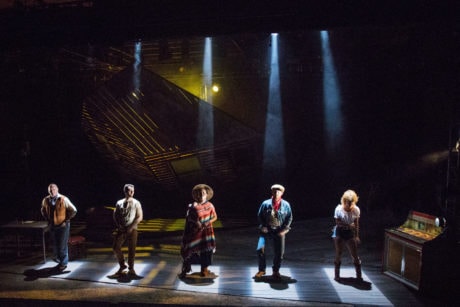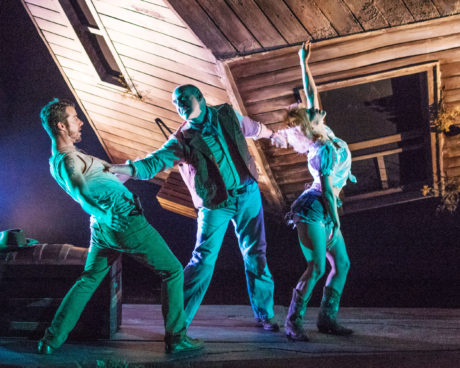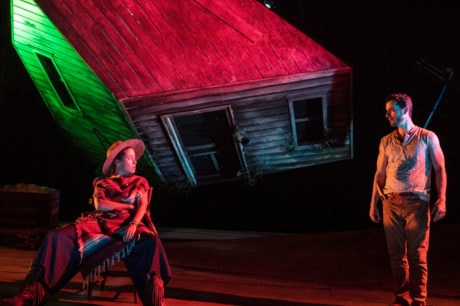Texas-born Octavio Solis is one of America’s leading contemporary playwrights, yet he is relatively unknown in the DC area. Now El Paso Blue—one of his most powerful plays—introduces his work to the nation’s capital with a short run at GALA Hispanic Theatre.

Although he has never previously had a play produced in Washington, Solis—who is the award-winning author of roughly two dozen works for the English-language stage—was recently honored at the Folger Theatre as part of Shakespeare’s 400th Birthday. He was televised live, along with retired Supreme Court Justice John Paul Stevens, a fellow Shakespearean devotee, on CNBC.
I caught up with the playwright in New York, where he was on tap for the opening performances of another play, Prospect, produced by the Boundless Theatre Company at Teatro Círculo in the East Village.
Ravelle: When did GALA contact you about producing El Paso Blue?

Octavio: It was November 2013, when José Carrasquillo, the director, and I both attended the first Latino Theatre Conference at Emerson College in Boston. Jose announced, then and there, that he would produce one of my plays at GALA. He chose El Paso Blue, and GALA chose to use it as the concluding production for its 40th anniversary season, ¡Viva los 40!
What led to the birth of El Paso Blue?
I was living in San Francisco in 1994 and was commissioned to write an original play for Intersection for the Arts, a multi-disciplinary group, similar to PS 122 in New York. The problem was that it had to be written and produced in three months.
At the time, I was 32 and working mainly as a director, but I really wanted to write plays, not just direct them, so I agreed. I wrote it in three weeks, in longhand and totally out of sequence, thinking I would rearrange the pieces at the end.
But when I finished, I realized that the nonlinear structure worked. Instead of one narrative, there are two stories that merge.
As it turned out, being forced to write fast—without workshops or any critical advice—was the best thing that could have happened. I knew what I wanted to do, and I did it. It was dangerous, but that gave it an edge. And I had studied theatre, so I understood both acting and directing.
I was also lucky with the music. I wrote the lyrics, then found Michael Hawkeye Herman, the guitarist who created the score. Working with Michael was a blast. He listened to my humming, then composed the songs. And it’s the songs that make the play come alive.
That was 22 years ago. Has the play changed a lot since then?
No. It’s essentially the same, but smoother. The original was very raw. Over the years, I’ve tightened and polished it. This is the 11th production.
Why did you choose El Paso as the setting for the play?
I grew up in El Paso. Like many children, I invested my early surroundings with mythic dimensions. At least five of my plays are set there. Right now, I’m writing a fictionalized memoir about my childhood.
My parents still live in El Paso. In a way, I’m tied to the place by an invisible umbilical chord.

Tell us about the characters in the play. Are they based on people you knew?
No, not at all. They are basically archetypes, drawn from Shakespeare, Homer, Greek mythology and the American western, but given flesh and blood of their own.
The story is a classic one of betrayal and the lust for revenge. A father and his prodigal son are rivals for the same woman—who just happens to be the son’s wife—and the father wins. The two run off, and the son sets off on a mission, with blood in his heart, to reclaim what was his.
I suppose the son is the character I most identify with since, like me, he’s the son of immigrants, a member of the first generation to be born on US soil, yet neither fully American nor Mexican.
What does El Paso Blue have to say to modern audiences?
I think it’s timeless. Partly because of the larger themes—the generational struggle and the subsequent quest for revenge—and partly because of its exploration of identity. Director Jose Carrasquillo, says that it sounds like it was written just yesterday.
Certainly it speaks to the issue of immigration policy. El Paso has a wall, just like the one that Trump has proposed. It’s a forbidding presence.
How does it feel to be called an ‘overnight success’ when you’ve been writing plays and seeing them produced for more than 30 years?
I’m amused. But in the theatre, you’re always “new.” The big surprise to me is seeing early works—like El Paso Blue—that emerge from the crypt and still manage to cast a magic spell.

Do you think of yourself as a ‘Hispanic’ writer?
I’ve never wanted to be pigeon-holed, but I am part of an older generation of writers who are concerned with who we are as Latinos in the US today. The big question is which parts of our culture we must abandon, and which parts we must keep.
However, there is a new breed of writers—still first generation, but 20 years younger than I am—who consider themselves unaffiliated. That’s increasingly the direction in which I want to go.
Running Time: Approximately 90 minutes, with no intermission.
El Paso Blue plays through June 26, 2016 at GALA Hispanic Theatre – 3333 14th Street, NW, in Washington, DC. For tickets, call (202) 234-7174, or purchase them online. Here are directions to GALA Hispanic Theatre.
Note: El Paso Blue is performed in English.





